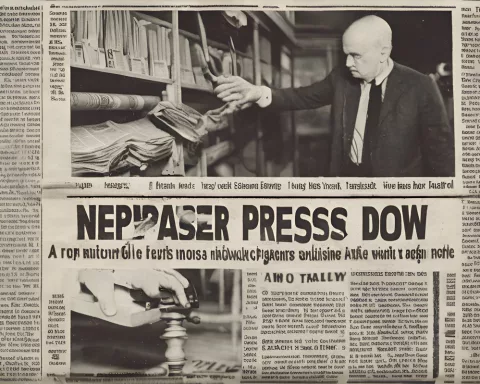Media24, a major media conglomerate in South Africa, has shut down five of its newspapers due to a decline in circulation and advertisement revenues, reflecting the impact of the digital revolution on traditional print media. This move is expected to cause significant job losses and highlights the socio-cultural implications of the shift to digital media, which could leave out a significant number of South Africans who don’t have access to electronic media due to technical or economic barriers. The future of print media in South Africa remains a pressing topic of conversation, as the switch carries a considerable human cost that shouldn’t be neglected.
What is the Impact of Digitization on Media24’s Print Journalism?
Media24, a major media conglomerate in South Africa, has recently shut down five of its newspapers due to a decline in circulation and advertisement revenues. The move highlights the impact of the digitization trend on traditional print media. The shift to digital media not only signifies the conclusion of an era for traditional print journalism but also poses threats to livelihoods and cultural norms. However, the transition to pure digital strategy is a predictable response to a severe decrease in circulation viewership and advertising revenues, coupled with escalating distribution expenses.
Recent Transformation in Media24’s Print Journalism Landscape
The print media landscape is undergoing an accelerated transformation, with dominant players struggling to maintain their relevance amid plummeting newspaper circulation and shrinking advertisement revenues. A stark example of this turmoil is Media24, a media conglomerate in South Africa, which has recently heralded the shutdown of five of its wide-reaching newspapers. This move marks a pivotal swing towards the digital media landscape.
The newspapers marked for closure incorporate the Afrikaans language publications, Rapport and Beeld, and the English language newspapers, City Press, Daily Sun, and Soccer Laduma. This strategic decision is expected to cause a significant loss of approximately 400 job positions, highlighting the broader economic ramifications of the declining traditional print media industry. The only major print publication within the company that is sustaining its circulation is Die Burger, based in Cape Town.
Impact of the Digitization Trend on Circulation and Revenue
The change towards a pure digital strategy is not an uncommon phenomenon; it is a predictable response to a severe decrease in circulation viewership and advertising revenues, coupled with escalating distribution expenses. According to data from The Outlier website, the circulation numbers for Daily Sun alarmingly fell by 95.8% from 283,216 in Q1 of 2014 to a mere figure of 11,889. City Press encountered an 89.8% drop, while Soccer Laduma underwent an 86.8% decline. Rapport and Beeld, the best survivors of this shrinking era, experienced a decline of 68.1% and 69.1% respectively.
In stark contrast to the reduced circulation in print media, Bob van Dijk, the former CEO of Naspers, has drawn increased attention due to his earnings. Over a comparable decade-long duration, van Dijk allegedly received R1.8 billion in salaries, which included R330 million in just the past financial year. This disclosure drew the ire of AfriForum, which challenged Media24’s budget-cutting initiatives, particularly when certain print editions continue to be profitable and the repercussions on employees are considered.
Socio-Cultural Implications of Media24’s Transition
AfriForum’s Cultural Affairs Head, Alana Bailey, expressed apprehensions about the consequences of such closures. The shift to digital media could potentially leave out a significant number of South Africans who don’t have access to electronic media due to technical or economic barriers. The decision also neglects the wider socio-cultural role that print newspapers fulfill in local communities.
The effects extend beyond just job losses. Bailey shared a touching story about a newspaper seller who relied solely on the newspaper delivery fee for income. The shutting down of these print newspapers endangers not only her source of income, but also her capability to provide for her three dependents.
The Future of Print Media in South Africa
As this saga continues to unfold, it’s clear that the shift to digital media is far from a seamless transition. It not only signifies the conclusion of an era for traditional print journalism but also poses threats to livelihoods and cultural norms. Meanwhile, the broader implications of these closures and the influence of print media in South Africa’s overall socio-cultural fabric continue to be a pressing topic of conversation. Though the future might be heading towards digitization, the switch carries a considerable human cost that shouldn’t be neglected.
How many newspapers has Media24 shut down and why?
Media24 has shut down five of its newspapers due to a decline in circulation and advertisement revenues.
What is the reason behind this transformation in Media24’s print journalism landscape?
The print media landscape is undergoing an accelerated transformation, with dominant players struggling to maintain their relevance amid plummeting newspaper circulation and shrinking advertisement revenues.
What is the impact of the digitization trend on circulation and revenue?
The shift to digital media not only signifies the conclusion of an era for traditional print journalism but also poses threats to livelihoods and cultural norms. The circulation numbers for daily newspapers have alarmingly fallen, leading to a predictable response to a severe decrease in circulation viewership and advertising revenues, coupled with escalating distribution expenses.
What are the socio-cultural implications of Media24’s transition?
The shift to digital media could potentially leave out a significant number of South Africans who don’t have access to electronic media due to technical or economic barriers. The decision also neglects the wider socio-cultural role that print newspapers fulfill in local communities.
What is the future of print media in South Africa?
The shift to digital media is far from a seamless transition, and the broader implications of these closures and the influence of print media in South Africa’s overall socio-cultural fabric continue to be a pressing topic of conversation. Though the future might be heading towards digitization, the switch carries a considerable human cost that shouldn’t be neglected.
How many job positions are expected to be lost due to Media24’s decision?
The strategic decision is expected to cause a significant loss of approximately 400 job positions, highlighting the broader economic ramifications of the declining traditional print media industry.












